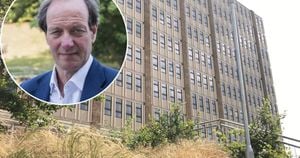A new Supreme Court bench, led by Chief Justice of India (CJI) Sanjiv Khanna, is set to hear the contempt plea against the Delhi Development Authority (DDA) concerning the unauthorized felling of trees along the Delhi Ridge—a significant ecological area. This case has raised questions about accountability, authority, and the environment.
The Supreme Court's hearing, scheduled for November 18, follows the previous bench's inquiries about how the DDA plans to restore the vulnerable area and the progress of tree planting efforts. During earlier proceedings, dismissed CJI DY Chandrachud's bench indicated their concern over the fragile ecosystem and proposed implementing monitoring systems to track the survival of newly planted trees.
Delhi's Lieutenant Governor, V.K. Saxena, wearing two hats as the DDA's ex-officio chairman, offered personal testimony regretting the unfortunate incidents of tree felling. His affidavit, which he submitted to the Supreme Court, acknowledged this misstep: "The unfortunate event of felling of the trees on account of certain acts of omission and commission on the part of the DDA, without the permission of this Hon’ble Court, is deeply regretted by the deponent."
Saxena's statements have shed light on the DDA's lack of compliance with existing regulations. He noted his own unawareness of the need for additional permissions from the Supreme Court before proceeding with the felling of trees, which adds another layer of complexity to this case. The Supreme Court had earlier ordered him to file detailed accounts of accountability actions against officials responsible for breaching court directives.
Prior to Saxena's testimony, the Supreme Court had signaled its intent to take serious action against the DDA vice chairperson for willful contempt of court, having questioned their management of tree felling without proper authorization. The court's comments implied full responsibility falls on DDA officials rather than contractors. "We are not prepared to believe the contractor entrusted with the work has indulged in cutting trees of his own volition. Obviously, it has to be on the basis of the instructions from the officers of the DDA," they concluded.
The serious issue of environmental preservation has caught the attention of not just the judiciary but the public as well, stirring debate on the responsibilities of civic bodies and their adherence to law. The DDA's actions would have unforeseen consequences for the region's environment, raising concerns among local communities who rely on the Ridge for ecological balance.
Overall, the upcoming Supreme Court hearing intends to explore these issues deeply. The local community, environmental activists, and legal observers alike will be watching closely, eager to see how justice is served to protect the Delhi Ridge's ecosystem from future mismanagement.



